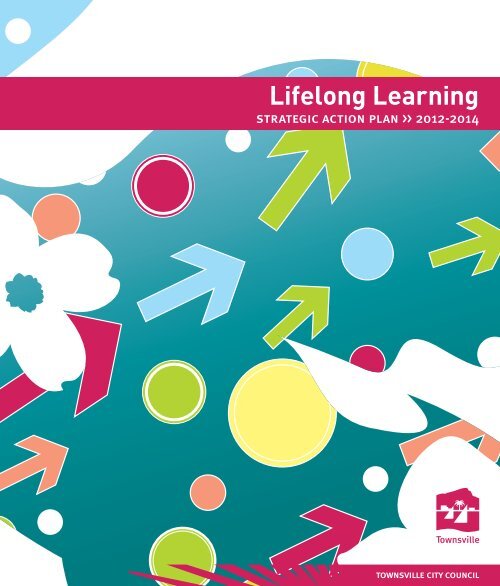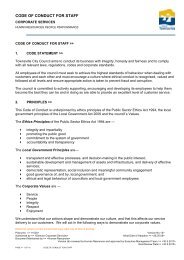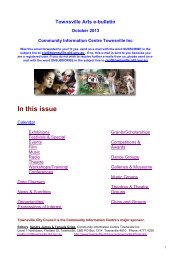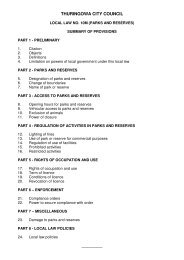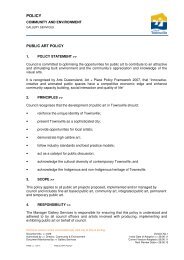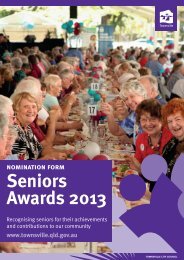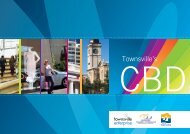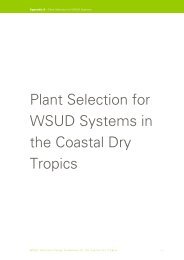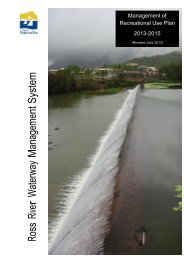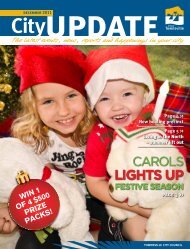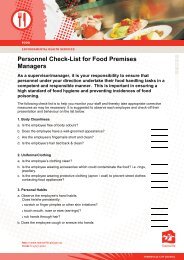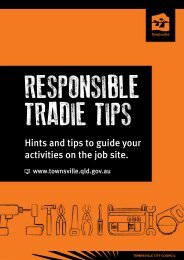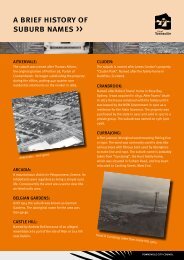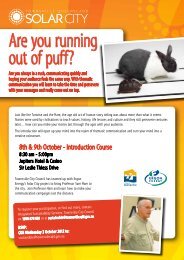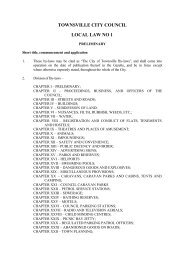Lifelong Learning - Townsville City Council - Queensland Government
Lifelong Learning - Townsville City Council - Queensland Government
Lifelong Learning - Townsville City Council - Queensland Government
Create successful ePaper yourself
Turn your PDF publications into a flip-book with our unique Google optimized e-Paper software.
<strong>Lifelong</strong> <strong>Learning</strong>strategic action plan >> 2012-2014
cover image >>learn audit - tree of knowledgeThe cover image stems from the concept donefor the Learn Audit campaign. The artworkrevolved around the tree of knowledge notion.The multitude of coloured circles and arrowsflowing from this represent the variety oflearning options and direction one can choosein life.pattern >> kapok and brolgatownsville’s flora and fauna emblemsThe Kapok tree is native to the <strong>Townsville</strong>region and is recognisable from its vibrantdisplay of yellow flowers. Just like the Kapok,<strong>Townsville</strong> is a vibrant and energetic city beingrecognised throughout Australia.Brolgas are gregarious creatures gatheringinto large flocks, which appear to be manyself-contained individual groups rather than asingle social unit, representative of <strong>Townsville</strong>— a community made up of a number ofdifferent groups.
<strong>Townsville</strong> – a city that values lifelong learning for its potential tobuild a cohesive and self-reliant community.
The <strong>Lifelong</strong> <strong>Learning</strong>Strategic Action Plan2012-2014 recognisesthe importance oflearning to developinga strong vibrantand economicallysustainable community.The plan hasbeen developedfrom a variety of engagement activities anddiscussions with key community representatives,organisations and community members from thecommunity. The <strong>Learning</strong> Audit that we undertookin 2011 investigated the extent of learningfacilities, services and providers in the city andidentified opportunities to develop access and theprovision of learning so that the community willbenefit fully from learning opportunities available.partnerships between council and communitymembers as we strive to meet the learning needsof our community.We look forward to the journey of implementingthe <strong>Lifelong</strong> <strong>Learning</strong> Strategic Action Plan2012-2014 and development of partnershipswith community stakeholders to build capacity,support and respond to current and futureidentified needs.Cr Jenny HillMayor of <strong>Townsville</strong>Our aim through this engagement and forthe coming implementation of the <strong>Lifelong</strong><strong>Learning</strong> Strategic Action Plan is to develop true
Methodology<strong>Townsville</strong> <strong>City</strong> <strong>Council</strong> has used a multi-faceted,inclusive, community engagement methodology toinform the development of the <strong>Lifelong</strong> <strong>Learning</strong>Strategic Action Plan 2012-2014.The objective of the methodology is to achieverich community engagement that adheres to the<strong>Townsville</strong> <strong>City</strong> <strong>Council</strong> Community EngagementPolicy, and a planning document that reflectsthe values and aspirations of the <strong>Townsville</strong>community.<strong>Townsville</strong> <strong>City</strong> <strong>Council</strong> believes in, andis committed to, fostering democraticrepresentation, social inclusion and meaningfulcommunity engagement to assist in the delivery ofa high quality local government.<strong>Townsville</strong> <strong>City</strong> <strong>Council</strong>’s Community EngagementPolicy is based on the following principles:>> provision of inclusive opportunities forinformed community involvement in council’sdecision making>> ensuring that all groups in the community areprovided with opportunities to engage with<strong>Townsville</strong> <strong>City</strong> <strong>Council</strong>>> commitment to the provision of culturallyappropriate processes to encourage increasedaccess by Aboriginal people, Torres Straitand South Sea Islander people, peoplefrom culturally and linguistically diversebackgrounds and people with disabilities,to participate in discussions about councilinitiatives>> adherence to an organisational communityengagement policy and framework thatfocuses on achieving meaningful communityengagement>> to foster a council-wide culture of communityengagementThe <strong>Lifelong</strong> <strong>Learning</strong> Strategic ActionPlan outlines actions that respond to theissues identified by the community and keystakeholders. The community engagementprocess included both broad-based and targetedengagement, and multiple techniques relevant tothe target groups. A comprehensive outline of thisengagement process can be found in the <strong>Learning</strong>Audit Report.4 <strong>Lifelong</strong> <strong>Learning</strong> Strategic Action Plan 2012-2014
About <strong>Townsville</strong>The traditional owners of the <strong>Townsville</strong> region arethe Bindal and Wulgurukaba peoples, and are thefirst known people to have lived in the <strong>Townsville</strong>area. Captain James Cook mentioned the regionin 1770. The name <strong>Townsville</strong> was created by anemployee in respect to his employer Robert Towns.This was the name adopted by the <strong>Queensland</strong><strong>Government</strong> when the township was surveyed in1865 and declared a municipality in 1866.<strong>Townsville</strong> is the largest city in north <strong>Queensland</strong>and has one of the fastest growing populations inthe state. At 30 June 2010, the estimated residentpopulation of <strong>Townsville</strong> was 185,768 people,and was ranked the seventh for largest growthfrom 2009 to 2010. <strong>Townsville</strong>’s population in2031 is projected to be 270,500 people, whichwill account for 4.3 per cent of <strong>Queensland</strong>’s totalpopulation.<strong>Townsville</strong> is located approximately halfwaybetween the tip of Cape York and Brisbane. Ourregion is characterised by diverse landforms andnatural environments. In the low lying coastalplain there are a number of rivers, creeks andfreshwater wetlands. Hills and mountains riseout of the coastal plain, creating distinctivelandmarks.These natural habitats support a wide range offlora and fauna including: 53 mammal species;a large number of reptiles and amphibiansincluding land snakes, estuarine crocodiles, anda diverse range of lizard and frog species; and atleast 365 bird species.Some of <strong>Townsville</strong>’s distinguishingcharacteristics include:>> <strong>Townsville</strong> has one of the largest populationgrowth areas in <strong>Queensland</strong>.>> Employment in <strong>Townsville</strong> is significantlystronger than the national and state averages.>> <strong>Townsville</strong> has one of the busiest regionalhospitals in <strong>Queensland</strong>.>> <strong>Townsville</strong> has the third busiest port in<strong>Queensland</strong>.>> Economic growth in <strong>Townsville</strong> is significantlystronger than national and state averages.>> <strong>Townsville</strong> is home to a large defence forcepresence.>> Internationally recognised James CookUniversity is based in the city.>> <strong>Townsville</strong> is a service and administrativecentre for north <strong>Queensland</strong>.<strong>Lifelong</strong> <strong>Learning</strong> Strategic Action Plan 2012-20145
Integration<strong>Lifelong</strong> learning is one of the means by whichindividuals respond to changes in society.<strong>Government</strong>s throughout the world are embracinglifelong learning and providing access to informaland formal learning opportunities as a solutionto social exclusion and disadvantage. Suchinvestment in learning has been demonstratedto improve not only the individual’s abilityto respond to change but also fosters socialcohesion, community wellbeing and economicsustainability.The community’s belief in the value of lifelonglearning is fundamental to the identification ofplaces and regions as learning communitiesglobal trendsThe recognition of learning as lifelong was giveninternational emphasis in 1973 by UNESCO(United Nations Educational Scientific andCultural Organization) in its published report, ofthe International Commission on the Developmentof Education, entitled “<strong>Learning</strong> to Be”. This reportcalled for a fundamental change in thinking abouteducation with its emphasis on teaching andteachers to one that focused on “learning andlearners”. It identified learning as not only formal,that is, institution centred and qualificationbased but also as informal, focused on individualdevelopment throughout life.At the same time the Organisation for EconomicCooperation and Development (OECD) promotededucation through upskilling and reskilling as ameans of stimulating economic growth in Europe.Following the OECD conference in Gothenburgin 1992 the concepts of “lifelong learning” and“learning communities” gained greater impetus.The learning communities movement with itsfocus on lifelong learning has spread from Europeto other parts of the world including, Canada,United States, Australia and parts of Asia andAfrica.australian government<strong>Learning</strong> communities have been developing inAustralia for more than ten years.In October 1999 the Australian federal governmentconvened the Regional Australia Summit todevelop strategies to address challenges facingregional Australia. One of the themes discussedwas “Education and Training in Regional Australia”.In that paper learning was emphasised as a vehiclefor building community resilience and wellbeing.6 <strong>Lifelong</strong> <strong>Learning</strong> Strategic Action Plan 2012-2014
IntegrationThis was closely followed by learning communityinitiatives in Victoria where the state governmentidentified lifelong education as a key toVictoria’s prosperity. Hume Global <strong>Learning</strong>Village in Victoria, formally established in 2004,is considered a good practice example of howcommunity needs and issues can be addressedthrough the provision of lifelong learningopportunities.The Australian <strong>Government</strong> recognises the valueof learning to sustainable economic developmentand social inclusion in many of its policies. Itsvision of a socially inclusive society, is one inwhich all Australians, feels valued and has theopportunity to participate fully in the life of oursociety. Achieving this vision means that allAustralians will have the resources, opportunitiesand capability to learn, work, engage and havea voice. The provision of learning and educationis also one of the strategies the governmenthas identified for the National Digital EconomyStrategy, Closing the Gap of IndigenousDisadvantage and in its Digital EducationRevolution.queensland governmentThe <strong>Queensland</strong> <strong>Government</strong> has an emphasison lifelong learning, education and training ina number of their strategic policy statements.Fundamental to these policies is social inclusionand the provision of access and equity. Thegovernment’s role is highlighted through formaleducation and training and through developingpartnerships with the community on initiativesundertaken in less formal settings.The government’s education white paper, A flyingstart for <strong>Queensland</strong> Children provides strategiesfor developing a quality education system in<strong>Queensland</strong>. Getting ready for primary andsecondary education and improving the level ofeducational attainment and skills is central to thisvision. In a Multicultural future for all of us – 2011there is also emphasis on providing school-basedinitiatives for students that support the learning,social and psychological needs young people fromculturally and linguistically diverse backgrounds.To prepare preschool children for school and todevelop literacy levels in the wider communitythe State Library of <strong>Queensland</strong> has developeda framework, Libraries for Literacy: every day,every way: 2011-2014. This strategic action plan<strong>Lifelong</strong> <strong>Learning</strong> Strategic Action Plan 2012-20147
Integrationresponds to low levels of literacy in the community.They have developed programs and services to bedelivered by SLQ in partnership with <strong>Queensland</strong>public libraries and other literacy providers.The <strong>Queensland</strong> Reconciliation Action Planprovides actions that are aligned to the Federalgovernment’s agenda to close the gap onIndigenous disadvantage. They have providedstrategies to engage Aboriginal and Torres Straitislander peoples in opportunities for learning,throughout life from early childhood to adulthood.Skilling <strong>Queensland</strong>ers for work offersdisadvantaged jobseekers customisedemployment and training assistance to meet theirindividual needs and the demands of the labourmarket for a skilled workforce.Absolutely everybody, enabling <strong>Queensland</strong>erswith a disability presents strategies for developinginclusive education and accessible learningenvironment for <strong>Queensland</strong>ers with a disabilityto achieve learning goals in settings of choicefrom early childhood, schooling, training, highereducation and beyond.Positively Ageless, <strong>Queensland</strong> Seniors Strategy2010-20 promotes participation, independenceand mobility for seniors to re-enter, or remain inthe workforce as well as support for lower skilledworkers to gain skills and confidence to enterthe workforce. It also taps into the wealth of theknowledge and experience of older people byproviding opportunities for seniors to volunteer inintergenerational, literacy and public programs.local governmentIn 2005, the Australian Local <strong>Government</strong>Association, President Cr Paul Bell called formembers to “encourage learning communities”.He said “A community committed to lifelonglearning and capacity building can contribute toexpanding commercial opportunities and offernew solutions to regional challenges.”Local government is ideally placed to lead thedevelopment of learning communities as it hasextensive knowledge of the community. It hasestablished networks and partners and the politicalauthority and resources to develop and sustainit. It can bring together different organisationsand groups to form a cohesive group that has acommon interest – lifelong learning. <strong>Council</strong>’s roleis to act as the enabler in building the community’scapacity to implement opportunities for learningthat will foster the development of a learningcommunity. Many local government authorities in8 <strong>Lifelong</strong> <strong>Learning</strong> Strategic Action Plan 2012-2014
Integration<strong>Queensland</strong> have incorporated lifelong learninginto their corporate plans.townsville city council<strong>Council</strong> supports the development of a learningcommunity in <strong>Townsville</strong> through its CorporatePlan strategy to “foster the development of thecity as a learning community”. Library Serviceshas a key role in its development through itsoperational plan actions that:>> Activity 3.4.1 Provide programs, services andactivities to meet the learning and recreationalneeds of the community.>> Activity: 3.7.16 Provide library services to meetthe needs of the community.<strong>Council</strong> has worked in partnership withorganisations working within the communityto develop lifelong learning opportunities thatare socially inclusive and foster personal andcommunity growth.community grants and sponsorshipThrough the Community Grants program,<strong>Townsville</strong> <strong>City</strong> <strong>Council</strong> is a significant contributorto enhancing the wellbeing of our city. One way inwhich council supports the community is throughongoing funding for community projects, includingprograms and activities that provide opportunitiesfor lifelong learning.Community Grants and Sponsorship Scheme Snap Shot:The Community Grants program has supported...projects/activities including:>> Museum of Tropical <strong>Queensland</strong> (MTQ) –Community Pass Program>> Volunteering North <strong>Queensland</strong> (VNQ) – Towardsthe delivery of Community Skills Workshops>> <strong>Townsville</strong> Multicultural Support Group (TMSG) –Towards the delivery of the Cultural Outreach toSchools Program>> Smart Futures 4 North <strong>Queensland</strong> – Towards theannual NQ Careers ExpoThe <strong>Learning</strong> Communities Leadership Group isa high-level reference group, intent on providingaccess to learning opportunities and developing<strong>Townsville</strong> as a learning community. Since theamalgamation of Thuringowa and <strong>Townsville</strong>, thisgroup has become a community forum of <strong>Council</strong>.<strong>Lifelong</strong> <strong>Learning</strong> Strategic Action Plan 2012-20149
10 <strong>Lifelong</strong> <strong>Learning</strong> Strategic Action Plan 2012-2014
Priority Area One:Programs and Participationgoal >> Community members are participating in informal, nonformal and formallearning opportunities that meet their needs.strategy 1 >> build the capacity of the community to participatein informal, nonformal and formal learning opportunities thatmeet their needsActionEnhance the delivery of lifelong learningopportunities by investigating flexible deliverythrough the internet.Initiatives>> Undertake a scoping study to identify optionsand resources for web delivery of lifelonglearning opportunities>> Identify current programming opportunities forweb deliveryActionDevelop and deliver a range of lifelong learningprograms that meet the needs and interests of thecommunity.Initiatives>> Increase attendance at library early literacyprograms that prepare children for formallearning at school.>> Increase participation in lifelong learningprograms that meet the recreational andinformational learning needs of adults in thecommunity>> Increase participation in the learningprograms, both partnered and council, thatbuild skills in digital technology12 <strong>Lifelong</strong> <strong>Learning</strong> Strategic Action Plan 2012-2014>> Continue to support council staff by providinglearning opportunities that increase theirpotential to make a valuable contribution tothe organisationActionDevelop partnered, socially inclusive lifelonglearning programs that meet the needs of thecommunityInitiatives>> Work with local schools and communityorganisations to provide informal learningopportunities for young people>> Partner with relevant organisations to provideprograms that build literacy and numeracy,employability and life skills for adults.>> Continue to expand community-basedlearning, through <strong>Learning</strong> Links volunteerssharing their skills with others>> Regularly engage with organisations workingin the Aboriginal and Torres Strait Islandercommunity, disability inclusion and culturallyand linguistically diverse sectors to shareinformation so as to increase participation inlifelong learning opportunities
Priority Area One:Programs and Participationstrategy 2 >> seek opportunities for grants and sponsorships tosupport program delivery.ActionContribute lifelong learning programs to theTogether <strong>Townsville</strong> Initiatives bank for corporatesponsorshipInitiatives>> Review current initiatives and identify gaps inlifelong learning opportunities>> Develop further initiatives to fill gapsActionInvestigate grant opportunities as they ariseInitiatives>> Submit applications for funding lifelonglearning programsOngoing learning keeps the mindfresh and open, challengeswork practices and encouragesbetter understanding.– townsville community member, 2011<strong>Lifelong</strong> <strong>Learning</strong> Strategic Action Plan 2012-2014 13
Priority Area Two:Access and Equitygoal >> All members of the community have equitable access to lifelong learningopportunities.strategy 1 >> improve access to lifelong learning opportunitiesfor disadvantaged groups.ActionInvestigate the delivery of lifelong learningprograms as outreachInitiatives>> Review current programming to identifyopportunities for delivery of informallearning and literacy programs as outreach incommunity centres and through place-basedcommunity organisations.Action:Continue to provide informal and nonformallifelong learning programs at little or no costthrough the library service<strong>Lifelong</strong> learning happensinformally all the time, it isgood to be able to identifyand label opportunities tosupport this.– townsville community member, 2011Initiatives>> Continue to deliver nonformal and informallearning programs that meet the needs of theculturally and linguistically diverse communityin developing English literacy and life skills.>> Continue to deliver culturally appropriatelearning and literacy programs at little or nocost through the library for the Aboriginal andTorres Strait Islander community14 <strong>Lifelong</strong> <strong>Learning</strong> Strategic Action Plan 2012-2014
Priority Area Two:Access and Equitystrategy 2 >> improve community access to information onlearning.ActionInvestigate the development of a comprehensivecentralised database of learning in <strong>Townsville</strong>Initiatives>> Partner with the Community InformationCentre, James Cook University and theBarrier Reef Institute of TAFE to scope thedevelopment of <strong>Learning</strong> <strong>Townsville</strong>You are never too old tolearn, whether it is benefitpersonally or professionally.– townsville community member, 2011ActionReview current provision of information oncommunity learning focussing on access andequity for everyoneInitiative>> Undertake review<strong>Lifelong</strong> <strong>Learning</strong> Strategic Action Plan 2012-2014 15
Priority Area Three:Partnerships and Networksgoal >> <strong>Learning</strong> providers are working together to provide lifelong learningopportunities in the region.strategy 1 >> support partnerships and strengthen networkrelationships between organisations who value lifelong learning.ActionFacilitate the development of partnerships andnetworks that will enhance informal, nonformaland formal learning opportunities in <strong>Townsville</strong>Initiatives:>> Facilitate greater interactions with businessand employer groups to identify their learningneeds>> Establish a learning and literacy referencegroup to work collaboratively to improveliteracy and learning opportunities in theregion.>> Hold an annual learning forum for learningproviders and facilitators>> Work with partners and networks to developan annual calendar of events16 <strong>Lifelong</strong> <strong>Learning</strong> Strategic Action Plan 2012-2014
Priority Area Four:Advocacygoal >> <strong>Lifelong</strong> learning is valued as essential to a cohesive and self-reliantcommunity.strategy 1 >> promote the value of lifelong learning as beneficialto personal and community wellbeing and economic sustainability.ActionEngage with key stakeholders to promote lifelonglearning to the communityInitiative>> Develop an Advocacy Plan for the <strong>Learning</strong>Communities Leadership GroupActionPromote council as a corporate role model fororganisational professional development andsupportInitiative:>> Seek opportunities to market council as acorporate role model in the community and topeer bodiesActionUndertake and support activities which promotethe value of formal, nonformal and informallearning and celebrate local learnersInitiatives:>> Celebrate the achievements and successof local people through an inspiring storiesproject that can spur others to learn>> Recognise and support the value of learningthrough an annual festival and through annualevents such as Adult Learner’s Week andChildren’s Book Week<strong>Lifelong</strong> <strong>Learning</strong> Strategic Action Plan 2012-2014 17
18 <strong>Lifelong</strong> <strong>Learning</strong> Strategic Action Plan 2012-2014
Implementation of the <strong>Lifelong</strong> <strong>Learning</strong> StrategicAction PlanThe <strong>Lifelong</strong> <strong>Learning</strong> Strategic Action Plan2012-2014 provides a framework to guide the<strong>Townsville</strong> <strong>City</strong> <strong>Council</strong>’s work with the communityby outlining priority areas for lifelong learningand the development of <strong>Townsville</strong> as a learningcommunity. This plan will be implementedover a two year period. The implementationof the plan will grow and develop partnershipswith community stakeholders to support andrespond to the identified priority areas. <strong>Council</strong>invites the community to be actively involved inthe implementation of initiatives and projectsoutlined in the plan.<strong>Council</strong> will annually review the progress of theinitiatives outlined in this plan, the outcomesof these reviews will be recorded on the councilwebsite.Copies of the <strong>Lifelong</strong> <strong>Learning</strong> Strategic ActionPlan 2012-2014 will be available at <strong>City</strong>Librariesbranches, the Community Information Centre andcouncil website.The initiatives outlined within this plan havebeen identified through the engagement process;however, these are not the only methodsavailable to reach the goals. <strong>Council</strong> welcomescontributions and ideas from communitymembers, groups and organisations which couldassist in achieving the goals identified in the<strong>Lifelong</strong> <strong>Learning</strong> Strategic Action Plan 2012-2014.Please visit the council website at:www.townsville.qld.gov.au and provide yourfeedback to library@townsville.qld.gov.au.<strong>Lifelong</strong> <strong>Learning</strong> Strategic Action Plan 2012-2014 19
AcknowledgementsThe <strong>Lifelong</strong> <strong>Learning</strong> Strategic Action Plan2012-2014 was developed from the informationprovided by the community through theconsultation and engagement process.<strong>Townsville</strong> <strong>City</strong> <strong>Council</strong> would like to thankand acknowledge the expertise, input, advicecomments and thoughts shared by individuals,groups and organisations that assisted in theshaping and development of this strategic actionplan.20 <strong>Lifelong</strong> <strong>Learning</strong> Strategic Action Plan 2012-2014
Related Documentsrelated townsville city councilpolicies>> Community Engagement Policy>> Information Privacy Policy>> Local Laws and Subordinate Lawsrelated townsville city councilplanning documents>> Community Plan 2011-2021>> Corporate Plan 2009-2014>> <strong>Townsville</strong> <strong>City</strong> <strong>Council</strong>, <strong>Learning</strong> Audit Reportand Appendix>> Aboriginal and Torres Strait Islander StrategicAction Plan 2011-2014>> Community Safety Strategic Action Plan2011-2014>> Disability Inclusion Strategic Action Plan2011-2014>> Families Strategic Action Plan 2011-2014>> Women’s Strategic Action Plan 2011-2014>> Senior’s Strategic Action Plan 201-2014>> Youth Strategic Action Plan 2011-2014>> Multicultural Strategic Action Plan 2011-2014>> <strong>City</strong> Plan>> Economic Development Planrelated commonwealth legistation>> Human Rights and Equal OpportunityCommission Act 1986>> Aged Discrimination Act>> Disability Discrimination Act 1992related queensland legislation>> <strong>Queensland</strong> <strong>Government</strong> Multicultural Policy2004>> Local <strong>Government</strong> Act 2009>> <strong>Queensland</strong> Anti-Discrimination Act 1991>> Community Services (Aborigines) Act 1984<strong>Lifelong</strong> <strong>Learning</strong> Strategic Action Plan 2012-2014 21
ReferencesAustralian <strong>Government</strong>, Closing the Gap on Indigenous Disadvantage: TheChallenge for Australia, February 2009 http://www.fahcsia.gov.au/sa/indigenous/pubs/general/Documents/closing_the_gap/closing_the_gap.pdfAustralian <strong>Government</strong>, Australia’s Multicultural Policy, The People of Australia,Australian <strong>Government</strong>, Skills Australia, Australian Workforce Futures, A NationalWorkforce Development Strategy, 2010, Australian <strong>Government</strong>, Australian Social Inclusion Board, Breaking Cyclesof Disadvantage, 2011, Australan <strong>Government</strong>, Australian Social Inclusion Board, Governance Models forLocation Based Initiatives, 2011, Brimbank Community <strong>Learning</strong> Strategy 2010-2013, European Commision, Directorate-General for Education and Culture,Implementing lifelong learning strategies in Europe: Progress report on thefollow-up to the <strong>Council</strong> resolution of 2002, Faris, R. and Peterson, W., <strong>Learning</strong>-Based Community Development: LessonsLearned For British Columbia - A Report submitted to the Ministry of CommunityDevelopment, Cooperatives and Volunteers, April 2000.Frankston <strong>City</strong>, <strong>Learning</strong> <strong>City</strong> Strategy, A Framework for Action, 2005-2007,Haukka, Older Australians and the Internet, June 2011, Hume Global <strong>Learning</strong> Village, <strong>Learning</strong> Together 2030, <strong>Queensland</strong> <strong>Government</strong>, Smart State Strategy, <strong>Queensland</strong>’s smart future,2008-2012, <strong>Queensland</strong> <strong>Government</strong>, A Flying Start for <strong>Queensland</strong> Children, 2011, <strong>Queensland</strong> <strong>Government</strong>, State Library of <strong>Queensland</strong>, Literacy FrameworkProject, Project Report, August 2011.<strong>Queensland</strong> <strong>Government</strong>, State Library of <strong>Queensland</strong>, Libraries for Literacy,every day, every way: 2011-2014, <strong>Queensland</strong> <strong>Government</strong>, Office of Economic and Statistical Research,<strong>Queensland</strong> Regional Profiles, <strong>Townsville</strong> <strong>City</strong>, Based on local government area2011, <strong>Queensland</strong> <strong>Government</strong>, The <strong>Queensland</strong> <strong>Government</strong> Reconciliation ActionPlan 2009-2012, <strong>Queensland</strong> <strong>Government</strong>, <strong>Queensland</strong> Skills Plan 2008, <strong>Queensland</strong> <strong>Government</strong>, Department of Communities, A multicultural futurefor all of us, <strong>Queensland</strong> Multicultural Policy 2011, <strong>Queensland</strong> <strong>Government</strong>, Department of Communities, Disability and CommunityCare Services, Absolutely everybody: enabling <strong>Queensland</strong>ers with a disability,2011, <strong>Queensland</strong> <strong>Government</strong>, Department of Communities, Positively Ageless,<strong>Queensland</strong> Seniors Strategy 2010-20, Werquin, Patrick, Recognising Non-Formal and Informal <strong>Learning</strong>, Outcomes,Policies and Practices, Organisation for Economic Co-Operation andDevelopment, 2010Melton Shire, Community <strong>Learning</strong> Plan 2008-2010, 22 <strong>Lifelong</strong> <strong>Learning</strong> Strategic Action Plan 2012-2014
<strong>Lifelong</strong> <strong>Learning</strong>strategic action plan >> 2012-2014Sport and Recreationaction plan >> 2011-2014Community Safetystrategic action plan >> 2011-2014Aboriginal and Torres Strait Islanderstrategic action plan >> 2011-2014Arts and Culturestrategic action plan >> 2011-2014Senior’sstrategic action plan >> 2011-2014Multiculturalstrategic action plan >> 2011-2014Disability Inclusionstrategic action plan >> 2011-2014Youthstrategic action plan >> 2011-2014Women’sstrategic action plan >> 2011-2014Familiesstrategic action plan >> 2011-2014townsville city councilCommunity Strategic Action Plans2011-2014


